Researchers at the University of Sussex rely on ultra-low-temperature (ULT) freezers for secure storage of a wide range of biological samples. However, laboratory technicians were facing numerous challenges with outdated freezers, including frequent breakdowns, high energy consumption and temperature fluctuations compromising sample viability. In this case study, Dr Rob Fowler, Associate Director of Technical Operations at the university, describes how he reached out to Haier Biomedical for help, the implementation journey, and the benefits of the new equipment.
CUSTOMER NEEDS
• Replace old, inefficient freezers
• Avoid sample loss and research impact
• Increase energy efficiency
• Cost savings
• Enable early detection of temperature fluctuations
• Improve insulation and cold retention
• Power outage mitigation
• Proactive preventive maintenance
• Alignment with university sustainability goal
Background and challenges
Rob and his team support the university’s researchers by maintaining various equipment, including cold storage facilities for biological samples. However, the university’s freezers – which were between 15 and 25 years old – were unable to maintain the required temperatures due to inefficient heat dissipation. This not only put research outcomes at risk, but also led to frustration among the university scientists.
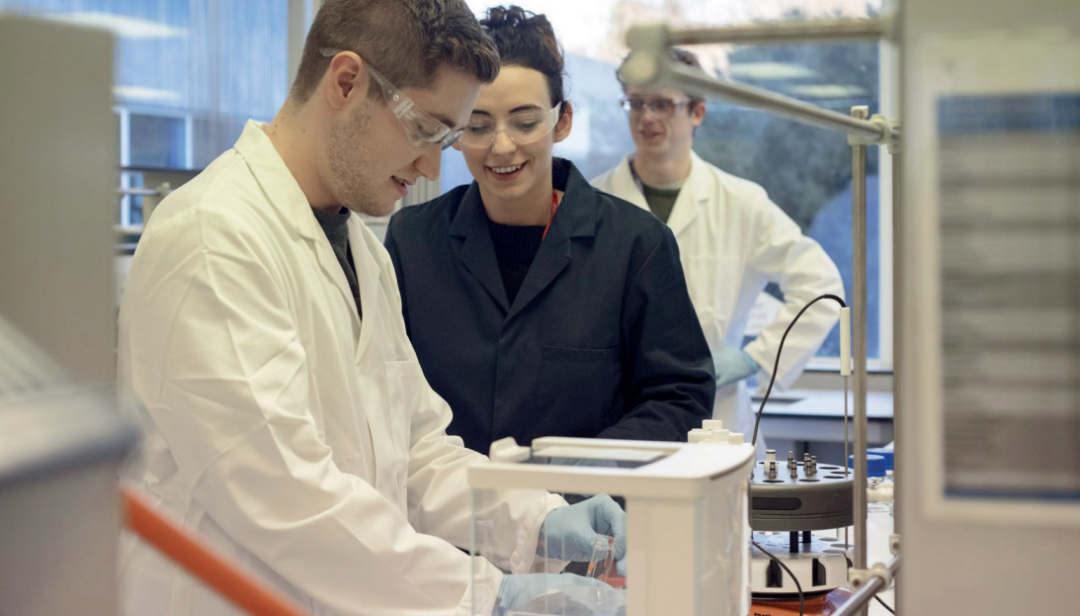
“Our previous ULT freezers were constantly breaking down, consuming excessive energy and struggling to maintain precise temperatures,” Rob explained. “This hindered our efficiency and jeopardised the integrity of valuable samples. To mitigate this, we developed an elaborate alarm system to alert technicians of temperature fluctuations. However, this system was far from ideal, and we often received requests to address issues in the middle of the night or during holidays. Additionally, our insurance only covered freezers and their contents if they were less than 15 years old, leaving us at significant risk of losing samples without a means of recovering the costs.”
The need for sustainability-focused upgrades
Alongside the issues being faced by researchers, the University of Sussex actively embraces sustainability initiatives, and has signed up for the Laboratory Efficiency Assessment Framework (LEAF). It was therefore essential to make changes to its cold storage provision, and to collaborate with a provider aligned with the university’s commitment to becoming a net zero institution. Rob sought a long-term solution to address the ongoing challenges, and put together a proposal for the purchase of more energy-efficient ULT freezers.
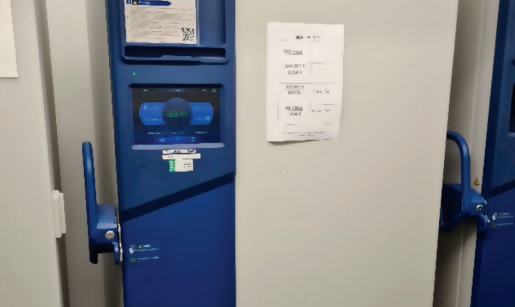
Rob and his team selected Haier Biomedical’s Salvum Ultimate BPT Frequency Conversion ULT Freezers as a potential solution, as these units incorporate frequency conversion compressors and hydrocarbon refrigerants to provide optimal sample security, energy efficiency and sustainability. He continued: “We decided to trial a -80 °C freezer from Haier Biomedical, and quickly noticed significant improvements in energy expenditure. It was crucial to demonstrate the enhanced sustainability of the new equipment, so I worked closely with the university’s sustainability manager to ensure that the collaboration with Haier Biomedical aligned with our goal of becoming one of the most sustainable universities globally. Upgrading our energy-intensive ULT freezers was clearly a necessary step, and the trial results assured us that acquiring more systems from Haier Biomedical would improve both efficiency and sustainability.”
Implementation and results
The Haier Biomedical freezers offer substantial advantages and savings compared to the previous equipment. The improved insulation and increased energy efficiency of the new freezers resulted in significant cost savings compared to the legacy units (Table 1), which cost on average £700 annually to power – equivalent to 20 kWh per day – depending on size.Furthermore, the reliability of temperature stability of the new freezers allows them to be set to -70 °C instead of -80 °C without affecting sample viability, providing an additional 50 % energy savings. As a result, the new Haier Biomedical freezers reduced energy consumption by approximately 12 kWh per freezer per day, with annual running costs to under £300 each.
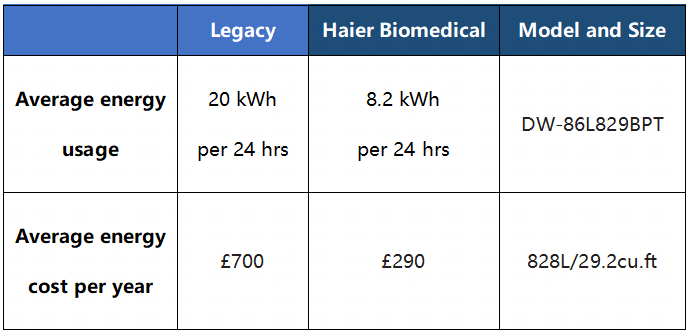
Table 1. Cost comparison of ULT freezers. Data based on electricity costs of £0.10 p per kWh in 2021
The upgrade also presented an opportunity for the university to consolidate cold storage and dispose of old samples. The improved accessibility and organisation of the new units has helped the team to reduce the overall number of freezers – from 24 to 20, with the majority of them now Haier Biomedical freezers – amounting to annual energy savings of approximately 100,000 kWh, or roughly £20,000 per year in energy costs. This has led to a return on investment within seven years, and helps the facilities to align with the university’s sustainability goals. In addition, the gradual replacement of old freezers has significantly reduced technician workload, eliminating the stress of sample loss and instilled confidence in the reliability of the equipment.
Another benefit of the new freezers is that the improved insulation ensures samples remain below -50 °C for up to 24 hours during power outages or other issues, compared to the previous freezers that quickly warmed up within the hour. This risk has been further mitigated by the installation of a backup generator to ensure uninterrupted power supply and preserve sample integrity. “Haier Biomedical’s freezers have been a gamechanger for us,” asserted Rob. “The advanced insulation and temperature retention capabilities have significantly improved sample preservation. Even in the event of a problem or power outage, we have an extended timeframe to safeguard our valuable samples. Haier Biomedical worked with us to establish a monitoring system that alerts us with a text, phone call and e-mail when there’s even a slight discrepancy in the temperature, giving us an extra level of confidence in these freezers.”
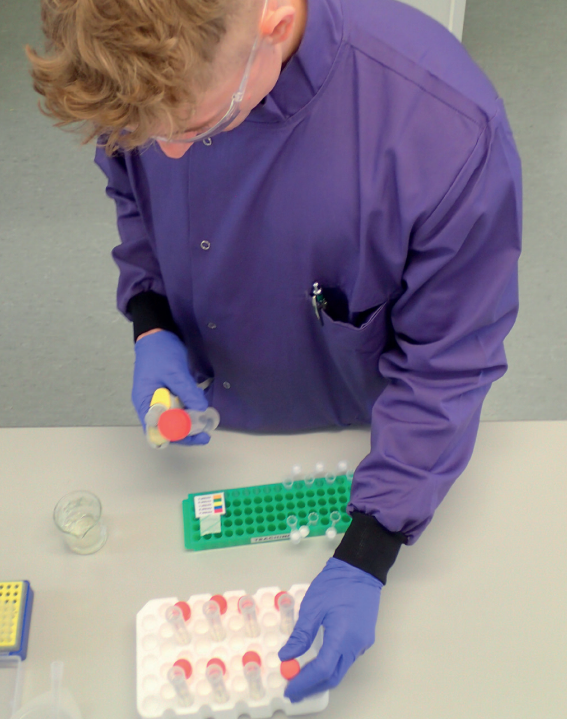
Partnership with an expert supplier
The University of Sussex’s choice to partner with Haier Biomedical has yielded significant benefits. Taking a proactive approach to address the challenges associated with the previous cold storage equipment has resulted in enhanced operational efficiency, improved sample preservation and led to substantial cost savings. By choosing Haier Biomedical, the University of Sussex has not only transformed its cold storage capabilities, but has also taken a significant step towards achieving its sustainability goals, and established a framework for future upgrades across various equipment categories.
“We chose to go directly with Haier Biomedical because the company took the time to come and speak to us,” Rob added. “That personalised service has made all the difference, helping us to enhance operational efficiency, ensure effective sample preservation and achieve significant cost savings. The team are always eager to assist us, which is why we are keen to continue working with them as we strive to become a leader in sustainability.”
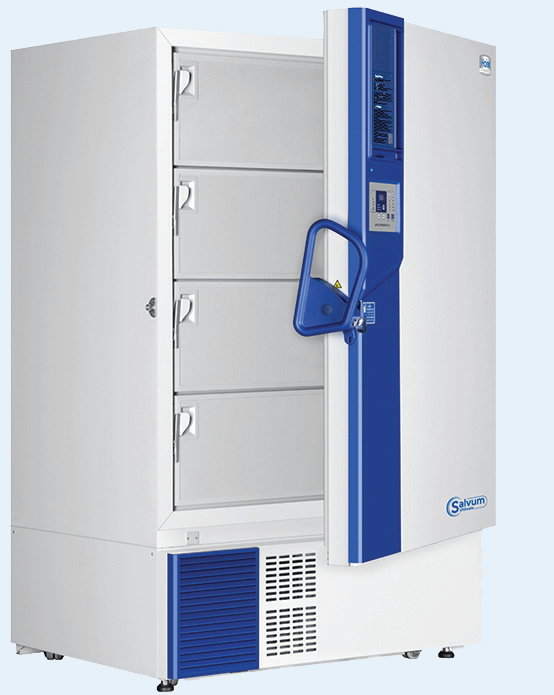
Model: DW-86L829BPT
PROJECT OUTCOMES
• Replace old, inefficient freezers
• Avoid sample loss and research impact
• Increase energy efficiency
• Cost savings
• Enable early detection of temperature fluctuations
• Improve insulation and cold retention
• Power outage mitigation
• Proactive preventive maintenance
• Alignment with university sustainability goal
article source: https://www.haiermedical.com/News/Haier_Biomedical_transforms_cold_storage_at_the_University_of_Sussex_for_maximum_sustainability.html
Media Contact
Company Name: Haier Biomedical
Email: Send Email
Phone: +86-532-88935593
Country: China
Website: https://www.haiermedical.com/
